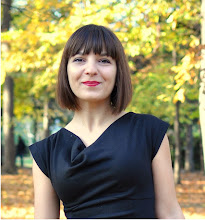In the eve of the referendum in Crimea on Sunday, I have talked to two deeply engaged Euromaydan-movement activists/ observers about what this event will mean for the future of Ukraine.
The Ukraine situation was of great interest to the Personal Democracy Forum Poland – Central Eastern Europe 2014 (#PDFPLCEE14). The event took place in Warsaw and from the first night in the city I could tell that solidarity with Ukraine is not only a matter for Polishpoliticians like Sikorski who remain steadfast in their pursuit of a stronger EU position related to Russian pressure on Crimea. From activists to buildings, everything in Warsaw shows a strong interest in supporting the Ukrainian cause.
 |
| The Palace of Culture in Warsaw illuminated in the colors of the Ukrainian flag |
During the two days of the #PDFPLCEE14, the Ukrainian experience was subject to many observations: from the importance of social media for Euromaydan (how Facebook was used not only to organize transport to the square but also for medical emergencies like blood donations) to what seems to be a serious information war between the activists and the official propaganda (i.e. the amazing story of human wi-fi hotspots which stood in the front row of the confrontation with the official forces in order to provide access to internet/ ammunition for the smartphone weapons).
I've heard the term “invasion” repeatedly deployed to describe the Russian position as well as observations on why it is clear that the referendum in Crimea won't be a fair one: Polish journalist Bartosz T. Wieliński was noting that you can't have fair elections/ referendum with soldiers patrolling the streets, a thought which was also expressed satyrically by cartoons from The Economist or Marian Kamensky:
 |
| Source: economist.com |
 |
| Source: cagle.com |
Marian Kamensky's cartoon was shown to me by Dymitro Gnap. He is one of the most amazing investigative journalists I've ever met. Not because he's Ukrainian or because he was one of the journalists that retrieved thousands of documents thrown in the lake at the residence of the former president Yanukovych. But because he is one of the best examples of the way in which journalism can adapt to the new technology era by staying relevant – he didn't keep all the documents for himself and his colleagues but put them all online on the awesome yanukovychleaks.org. Together with Chris Worman we interviewed him today so here's his story briefly:
Besides the fascinating work he is doing in discovering the abuses and corruption of the former regime (a real form of transitional justice in my opinion), Dymitro resumed in a realistic manner the entire drama of the current Ukrainian dilemma: they have managed to shut down a regime that was criminal and corrupt, but cannot put instead of it a political class which can show authentic leadership. I asked him about who could do something about Crimea, in a scenario in which the region is, in his opinion, subject to an illegal referendum:
The lack of leadership (and I think Dymitro makes a simple but powerful portrait of how the political class should look: honest, courageous and smart) is also the main message that the Ukrainian activists embrace.
Vadym Hudyma is one of the activists that manage the Facebook page of the Euromaydan. In the same realistic manner, he says that the Crimean crisis is a lose lose game: the politicians in power cannot give up on Crimea cause it would give a bad message to the people (it would look like they are willing to abandon part of the population) and the Putin administration cannot back up after all the messages it sent over the past months. In his opinion, nobody was ready for this “invasion” nor had an exit strategy:
I have also heard the term “revolution” accompanied a certain degree of enthusiasm and a visible empowerment of the Ukrainians who do seem to believe that they have managed to make their voices heard. However, what struck me the most is a strong reticence upon the victory of the Euromaydan movement. No matter how powerful the internet is in democratizing the Ukrainian society it seems like, in the words of Svitlana Zalishchuk:
.
These interviews were recorded during the Open Data Hackathon Central Eastern Europe 2014 which followed the Personal Democracy Forum. You'll find other videos also on Chris Worman's blog. Neither Chris or I have programming skills. But we have mobile phones, blogs and use social media. And had among us inspirational individuals. This is our own way of making democracy personal so please excuse the low quality of the videos. However, the sounds of the kids in the background do make a nice addition, don't you think? :)





















